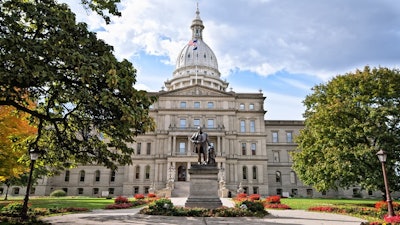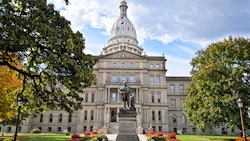
The Michigan Regulation and Taxation of Marihuana Act will provide for three cultivation-license tiers at the outset.
By Noelle Skodzinski
The Michigan Coalition to Regulate Marijuana Like Alcohol (also known as Regulate MI) on May 5 officially submitted ballot language to the State of Michigan to legalize and regulate marijuana for adults 21 and older in the state with the goal of gathering enough signatures to get the initiative on the November 2018 ballot.
The proposal, titled the Michigan Regulation and Taxation of Marihuana Act, “will create a state-regulated system of licensed marijuana businesses that will cultivate, process, test, and sell marijuana and marijuana-infused products to adults 21 and older,” according to initiative language. It also would allow for home cultivation of certain types and amounts of marijuana by adults 21 and older.
The initiative would make licenses available for cultivators, processors, testing facilities, secure transporters and retailers. Testing and labeling of marijuana products would be required, and driving under the influence would remain illegal.
The proposal calls for the enactment a 10-percent marijuana excise tax, in addition to the state’s 6-percent sales tax, on retail sales of marijuana.
According to the ballot language, the Department of Licensing and Regulatory Affairs, which will promulgate regulations:
“shall issue the following state license types:
- marihuana retailer;
- marihuana safety compliance facility;
- marihuana secure transporter;
- marihuana processor;
- marihuana microbusiness;
- class A marihuana grower authorizing cultivation of not more than 100 marihuana plants;
- class B marihuana grower authorizing cultivation of not more than 500 marihuana plants; and
- class C marihuana grower authorizing cultivation of not more than 2,000 marihuana plants.”
The department also would set “requirements that provide for the issuance of additional types or classes of state licenses to operate marihuana-related businesses, including licenses that authorize only limited cultivation,” among others, according to the ballot language. It also will set security requirements, “… provided that such requirements do not prohibit cultivation of marihuana outdoors or in greenhouses.”
Hemp cultivation would be legalized and regulated under the initiative.
Municipalities would be able to ban or limit the number of marijuana businesses within its boundaries. They may also require businesses to obtain municipal licenses.
In addition, the department will hold “at least 4 public meetings each calendar year for the purpose of hearing complaints and receiving the views of the public with respect to administration of this act.”
The ballot language was the result of a collaborative effort between the ACLU of Michigan, Michigan NORML, MILegalize, the National Patients Rights Association, the Michigan Cannabis Coalition, the State Bar of Michigan Marijuana Law Section, and the Drug Policy Alliance, according to a press release from Regulate MI.
A representative from Regulate MI was not immediately available for comment.
Public Support
The bill will be welcome news to supporters of last year’s failed ballot attempt at an adult-use marijuana legalization measure by MILegalize, which is a leading cannabis-legalization organization in the state that announced unity with the Regulate MI in April. While MILegalize had submitted the required number of signatures to secure the initiative a place on the November 2016 ballot, the initiative then got trapped in lawsuits over a state policy and ballot signatures that were more than 180 days old.
Support for marijuana legalization in the state is growing, according to a EPIC-MRA (Educational, Political, Industrial, Consumer Market Research Analysis) of Lansing telephone poll conducted in January and February 2017, and reported on MLive.com.
“The poll shows 57 percent of the 600 people surveyed said they would definitely vote yes, probably vote yes, or lean toward voting yes on a ballot question about legalizing marijuana in Michigan with certain conditions, according to an EPIC-MRA news release,” MLive reported. “The results are up four points compared to a similar poll in March 2016, EPIC-MRA said.”
Image: © Adeliepenguin Dreamstime.com


























